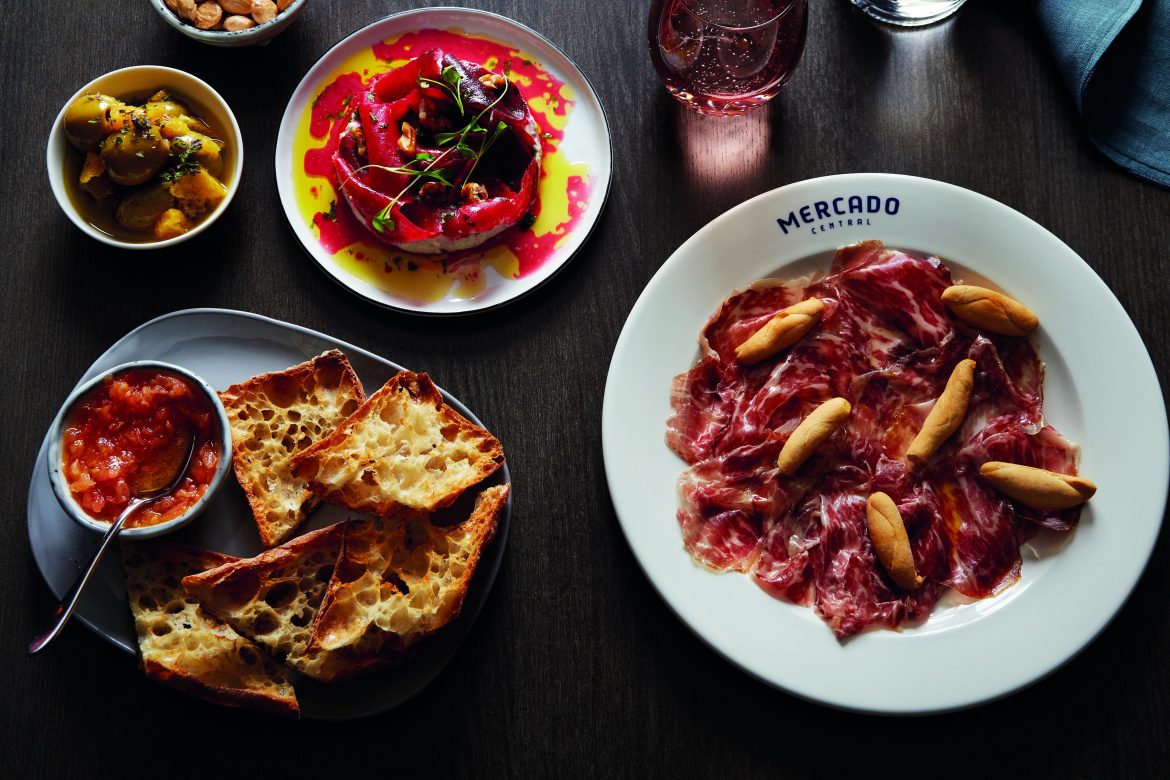Charlotte Griffiths heads to Mercado Central to see how the restaurant is bringing Spanish cuisine to our plates
The old maxim is true: there are always two sides to every story. Mercado Central is a restaurant that was years, even decades in the making – yet to Cambridge’s food fans it seemingly appeared on Green Street almost overnight, opening its doors with minimal fuss just before Christmas 2019 and immediately winning an army of supporters. It serves Spanish food with nods to the British seasons, using the finest produce that money can buy from both countries. Step through the door and you’d be forgiven for thinking you were in Madrid, or London’s Soho – the pin-sharp interiors, the Spanish team beaming smiles as they cook in the open kitchen, or the array of fresh fish on the ice bar at weekends: it’s only the unique views up picturesquely-cobbled Green Street that root you in the central Cambridge location.
Two of the restaurant’s management team, Mark Hughes and Daniel ‘Dani’ Grana Duran, lead me up and down the stairs in their beautiful new restaurant, introducing me to their many chefs, showing me produce in the fridges, remembering something exciting back up two floors that they have to show off right now – their pride and enthusiasm is evident in every step we take around the listed building. Mark runs bars in both Madrid and London, while Dani is best known to Cambridge’s foodies as the man behind Pata Negra Spanish Food: his background in supplying the hospitality trade with fine foods and ingredients, honed while working in the music business and touring with bands (“a music tour that turned into a food tour” Mark jokes about his friend) means he’s perfectly placed to locate the very best version of pretty much any foodstuff you can name.
Step through the door and you’d be forgiven for thinking you were in Madrid, or London’s Soho
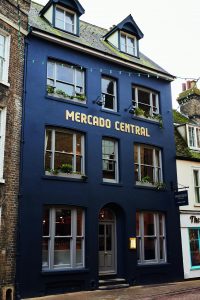 “Dani and I first met getting drunk in the Three Horseshoes,” Mark grins, “having been introduced by a mutual friend because we’d both lived in Madrid. We got on really well, then I moved away, but ended up living back here again because Lee, my twin brother lives here – Dani was the first person I met up with when I got back, and he suggested we look at doing something together.” Dani had always wanted to have a restaurant of his own. “I have a friend who came to England to play football – Gaizka Mendieta, who used to play for Middlesborough – and he was interested in investing as well,” Dani explains. Along with Mark’s brother Lee, this quartet formed the main team behind the business: but like most new ventures opening in our city, it took a long time to find the right property.
“Dani and I first met getting drunk in the Three Horseshoes,” Mark grins, “having been introduced by a mutual friend because we’d both lived in Madrid. We got on really well, then I moved away, but ended up living back here again because Lee, my twin brother lives here – Dani was the first person I met up with when I got back, and he suggested we look at doing something together.” Dani had always wanted to have a restaurant of his own. “I have a friend who came to England to play football – Gaizka Mendieta, who used to play for Middlesborough – and he was interested in investing as well,” Dani explains. Along with Mark’s brother Lee, this quartet formed the main team behind the business: but like most new ventures opening in our city, it took a long time to find the right property.
“We looked at this building and thought it was interesting, but there were a lot of issues with it – though the good thing about it is that it’s independently owned and we weren’t dealing with the University, so I felt that we could really negotiate the deal: we had time to do it at a personal level.”
‘Though the building was… falling down,” Dani adds. “It took us almost two years to get here.”
“It was about a year to find it, and a year to sign the contract,” Mark continues: “it was just the issues with the place when we got it. It was a hard job to find a place in the centre of Cambridge where you could open up an independent restaurant: we held out for the right place, and this wasn’t perfect, but it was available and we thought we could make it work. We’d rather have more independent restaurants around us: there are a few on the street, but we’d love more – if there’s a bigger food scene, more people will come out,” he says.
The once dark space has been transformed into a bustling, bright white kitchen, packed with chefs from Valencia, San Sebastian – preparing an exquisite array of produce from throughout Spain
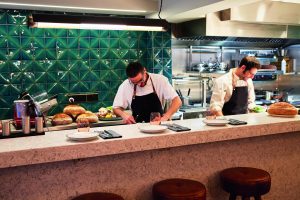
Mercado Central’s kitchens are now two flights downstairs, in what used to be Lotus Thai’s lower dining room: here the once dark space has been transformed into a bustling, bright white kitchen, packed with chefs from Valencia, San Sebastian – preparing an exquisite array of produce from throughout Spain. “Everything is completely and utterly prepared from scratch,” Mark says, while the chefs moved between stations. “The beef we get: it sounds a bit hipster-boring but we always know exactly where it came from, when it was killed, what it ate – the fish: on Thursdays, Fridays and Saturdays we have an ice display with fresh fish from Cornwall, and whatever our suppliers catch, we take, and we always serve the whole fish: prepared really simply, grilled, with lemon, garlic and olive oil. It’s all very much Spanish and British, the best of both.”
“We also do anchovies: most people buy them in tins, in olive oil, but what we do is get them from a place called Santoña in Cantabria, where you get the best anchovies in the world. There they’d salt them in barrels: now, we can’t get the barrels – logistically it’s a bit difficult – but we get them packed in salt, and then clean them, desalinate them, and then put the olive oil on them. When people come and you only get a few anchovies, they think it’s expensive for a little plate of food… but in Spain, this’d cost you a fortune. They’re a delicacy.”
Explaining the worth and value of their food is a real focus for the Mercado Central team. “Our restaurant is all about education,” Mark says. “It’s hard: on a Friday or Saturday night you can’t talk to everyone, and staff come and go – so trying to train them is difficult – but our business is all about explaining this,” he gestures to the anchovies – “this is what we do.”
Their menu is packed with Spanish classics like paella and tortilla
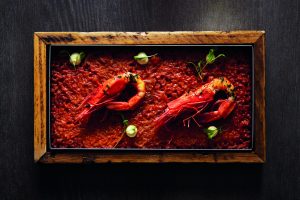
Their menu is packed with Spanish classics like paella and tortilla – the word tapas is eschewed in favour of sharing plates, emphasising the welcoming feel to a dining experience – and every single aspect of each dish has been carefully considered. “We make paella in the way they make it in Valencia: it’s not a holiday paella,” Mark explains: “Basically you have it in a little tin: the idea is to have a thin layer of rice, and you want the rice to stick to the bottom – where it sticks with the stock is where you get all the flavour. It’s called socarrat.”
It’s this sort of detail, this passion for flavour and ingredients, that comes across in every bite of Mercado Central’s food, or snippet of conversation with the co-owners. “He’s really done his homework,” Mark says of Dani’s seemingly limitless knowledge of Spanish foodstuffs, gently teasing his business partner: “and one ingredient or another might run out at some point, but we’ll have it until we don’t. And we’re so seasonal: take this salad – last month we had it with different produce, but right now it’s made with blood oranges, because they’re only around for a month or so.”
The perfect way to demonstrate the attention to detail is by describing the process involved in Mercado Central’s neat tortilla: “Most people will have a tortilla on holiday, and it’s not done right – it’s set in the middle,” Mark begins. “The way it’s supposed to be in Northern Spain is where it’s loose in the middle – creamy inside, but cooked enough. And to do that, you have to find the best eggs: we get special eggs from Stow-on-the-Wold, laid by chickens called Arlington Whites: we agreed we could only do this tortilla in England if we found the right eggs, otherwise we wouldn’t do it.”
Their chefs then confit onions for hours until they’re dramatically reduced in quantity, then fry potato crisps – homemade, of course – before mixing the crisps, onions and eggs together, and bringing the tortilla together from there. It’s a labour of love – like everything that comes out of Mercado Central’s kitchen.
You’ve got to feel at home – that’s what we’re here for. The food’s got to have integrity – but it’s got to be fun as well
“I think for Cambridge we’re quite different: we’re much more like a London restaurant,” Mark says. “We try to have nice, informal service but we mainly want people to come here, eat some good food, have a laugh – we’re not pretentious. It’s got to be informal, it’s got to be fun: we have people who come here and sit for five hours to have lunch. You’ve got to feel at home – that’s what we’re here for. The food’s got to have integrity – but it’s got to be fun as well.”
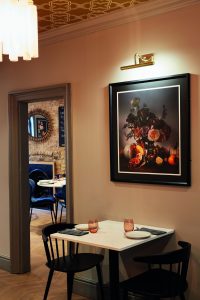 Though it has continued to enjoy success, the last few months have been extremely tough for the hospitality industry, and Mercado did not go unscathed. The restaurant was closed for a full five months, utilising the government’s furlough scheme to keep its employees on the books and reopening in time to offer the Eat Out To Help out scheme during August. The main challenges now, explains Mark, are the lack of passer by trade, having to make do with lower staff numbers, and the general air of uncertaint about the future.
Though it has continued to enjoy success, the last few months have been extremely tough for the hospitality industry, and Mercado did not go unscathed. The restaurant was closed for a full five months, utilising the government’s furlough scheme to keep its employees on the books and reopening in time to offer the Eat Out To Help out scheme during August. The main challenges now, explains Mark, are the lack of passer by trade, having to make do with lower staff numbers, and the general air of uncertaint about the future.
“Our business model right now is just reacting to the new rules and keeping it tight. We’re open five days a week at the moment and only in the evenings and we’re reacting to what’s going on and being flexible the whole time: whatever’s in front of us we’re trying to deal with. The issue we have is that we can’t risk opening more hours at the moment unless we know we can do more business, so we’re just trying to see what happens.”
“There’s a lot of things that people don’t always understand or see. People come to a restaurant to have a lovely time, and we try to give them that. Everyone is coming in expecting the same and we’re giving them it: the same service, the same quality, but behind the scenes it’s much harder”, he continues. “You don’t have many staff and you also can’t make plans like you did before. If someone’s away, they’re away, you can’t just find someone tomorrow because people aren’t moving around; they’re not even out. It’s so hard even to do the rota every week.”
Because we’re an independent restaurant and we’re quite hands-on, we get to know lots of people and there’s a nice vibe
Despite these issues, the team is delighted to back at the helm and doing what they love, spurred on by Mercado’s loyal fans. “We’re starting to get a feel for it now, we’re getting good bookings and we’re very happy with the way the restaurant’s going. I think because we’re an independent restaurant and we’re quite hands-on, we get to know lots of people and there’s a nice vibe.“Logistically it’s very hard for us, and that’s the bottom line,” he concludes. “But we’ve had great support from people, and people have come back loads. I think people like the fact that we are independent, and I think people have really supported us. We really lucky and really appreciative for that, so thank you.”

